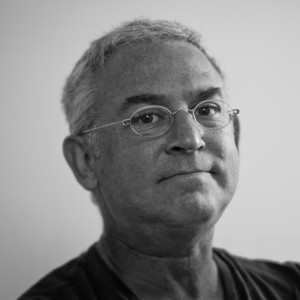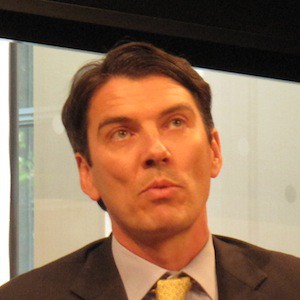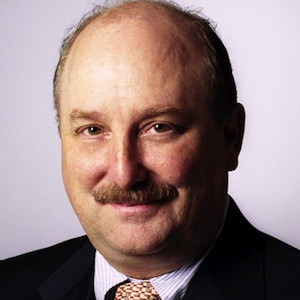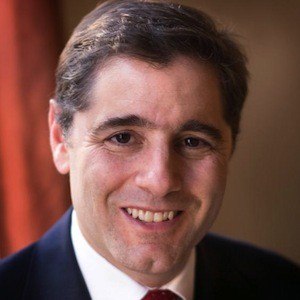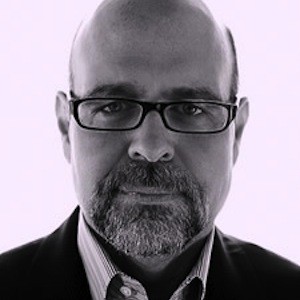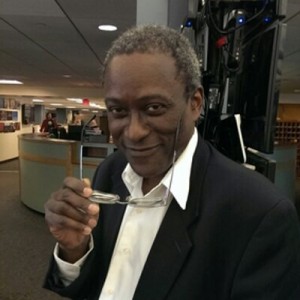John: Let’s start. I’m here in Washington with Walt Mossberg of
Re/code
Walt, why don’t you start telling me about your career path?
How did you get here?
Walt: This is turned on. Geddes.
John: This is turned on. I checked it. The red light thing.
Walt: Because I’ve known you a long time. I don’t associate you
with this.
John:
Walt: How did I get here? I worked for the Wall Street Journal for
43 years. They hired me out of the Columbia Journalism School
directly in 1970.
I spent just under 20 years, a few years covering the auto
industry in Detroit, which is an interesting story, only because we
had a five-person bureau there. Two of them went on to be managing
editors of the Journal, one went on to be national editor of the
journal, another went on to found the New York Sun, and I was the
least successful. I went on to be me.
John:
Walt: But mostly it was in Washington. I had a variety of beats. I
covered energy when it was a hot topic. I covered the Pentagon
during the Reagan buildup, the defense buildup. I was the deputy
bureau chief there for a few years in Washington.
Then, I covered international economics and the trade war we
had with Japan in those days. Then, I covered the national
security, really got to cover the collapse of communism and the US
winning the cold war. But all that while, the last 10 years, I
became computer hobbyist. I had no background. I never entered the
computer building at college. I was a politics major.
John: No Fortran, nothing like that?
Walt: Nothing. I bought a computer and I learned Basic. I joined
the precursors of the Web, the precursors even of AOL, which were
called “bulletin boards.” I joined CompuServe where there was a forum for
people with Apple IIs.
That was not my first computer,
but eventually, I had an Apple II. Most of our conversation was,
“How the fuck do you get this to work?” or, “How the hell do you
get this to work?”
Walt: That could be another take.
John: Give me a break.
Walt: “How the hell do you get this to work?” And people
would say, “I figured out a way to do this.” “Oh, that’s great.” “I
figured out a way to do that.”
Years later, after I became a columnist on tech, I would
occasionally meet these people, who said, “Do you remember me? I
was in that forum.”
But mostly, we didn’t know each other. That was my
introduction to the idea of online communities. Anyway, I taught
myself computing. I did a few freelance pieces for computer
publications. I did one article for a special section…actually,
it was a cover article. The “Wall Street Journal” ran a special
section about computing.
I think it was the first thing they ever did on it. I wrote
the cover story, and I became a little bit of a…when I became
deputy bureau chief in Washington, I bought everybody a Radio Shack
Tandy Model 100 which is sitting up there.
But it was a hobby. I was busy covering the Pentagon and
covering all these other things I explained. In 1990, I went to see
the managing editor of the Journal, Norm Pearlstine. He’s now the
chief content officer, or something, of Time Inc.
He said to me…I’ll never forget. I went to New York. I was
always based in Washington. I never worked to New York. I turned
down countless jobs in New York. But I went to New York and I
walked in his office. He goes, “What do you want?”
“I just gave you a raise.” This is literally what he said. I
said, “Thank you. I know that. But that’s not what I’m here about.”
He goes, “What are you here about?” I said, “I want to stop
covering national security, and I want to write a computer and
technology column.”
He goes, “Really? Tell me a little more.” I said, “Well,
we’re the last newspaper to have this kind of column.” The New York
Times had one. A lot of other newspapers had them. “But for the
most part, these columns are by geeks for geeks, there’s a lot of
jargon, and they’re very reverential about the computer industry.
“Here is my idea,” which I gleaned from being a hobbyist and
having to spend all these hours learning this thing. I said, “These
things are too hard to use, and they’re about to explode.” This
conversation was taking place 13 years after the Apple II came on
the scene, 13 years after the computer had entered… .
A lot of people had computers but nothing compared to the
number that we’re going to them over the next 10 years. I said,
“It’s about to be democratized. It’s going to about to be a
situation where people who have no interest in knowing how this
works are going to need to feel comfortable with them.
The companies are going need to adjust. I want to write a column
that flips the formula on its head. No jargon. Only English.
Champion the non-techie. I’m going to ignore the enthusiasts, the
hobbyists, the techies. They’re all read it anyway, I guarantee
you. But that’s going to be my focus.
Because I think, in anything you do, including journalism,
you’d better have a focus, a laser focus. Norm, I’m going to be
critical of the companies for ignoring that audience, because they
are ignoring that audience. Some of those companies are our
advertisers, but that’s what I want to do.”
Norm said, “That’s the best idea anybody’s brought me since
I’ve been managing editor. I love that idea. But you can’t do it
for a year, because national security is so important right now.
I’m telling you that…”
John: This will happen.
Walt: “…this will happen.” So in ’91, after the end of the Gulf
War — the good Iraq War, which I covered — I said to him, “OK,
I’m ready.”
There was some kerfuffle. I had to write a written
proposal which I did and I still have around somewhere. There was
some kerfuffle in New York about where I wanted to be on the front of a
section every week. He had to convince the publisher and all this
kind of stuff, but it got done.
What I said to him was, “Look, I want the prominence in the
paper and I want the leeway. If it fails you can cancel in six
months and you can either fire me or I’ll go back and I’ll be a
beat reporter. If it succeeds then we keep going.” It didn’t take
six months, it took 8 to 10 weeks. It was like the cocktail party
effect.
He would go to a cocktail party, the publisher would go a
cocktail party, and somebody would say, “I love that new column. I
finally understand this stuff.” It became a hit. That was, to me,
important on a number of levels. It wasn’t important that there was
a computer column in the Wall Street Journal — there were plenty
of computer columns — but it was the sense of being able to be a
little bit entrepreneurial.
By the way people in D.C. thought I was out of my mind.
They all thought I was demoted. I actually had a conversation with
the Secretary of State at the time James Baker, Jim Baker, who I
had been covering for five years. I said, “I’m going to leave the
beat.”
Each head journalist tells him that a lot. He said, “Are
you going to the White House, Congress?” I said, “No, I’m going to
write a column about technology and computers.” His exact words
were, “What the fuck do you want to do that for?”
I learned later that the minute I left the State Department
building he had his assistant, his top PR person, start calling
around to find out why I’d been demoted, what had happened. So, I did
that. It was very successful. That was in 1991.
Then in 2001 or 2002, I had already become friendly with a
terrific journalist named Kara Swisher who had worked at the
“Washington Post,” written a book on the rise of AOL, and I had
talked her into switching to the Journal. She was based in San
Francisco and she also had a column in the Journal. Mine was
focused on products, hers was focused on the industry out there.
We decided we could run a tech conference that would be
much better than the tech conferences that were running at the
time, and that we could make it journalistic, that it would break
news or illuminate news topics. We decided to do it by banning
speeches, by banning PowerPoint and by just doing what we called
“Wall Street Journal” interviews on stage.
Real interviews done by real journalists. We’d follow-up,
we’d do whatever. Instead of going to the business side of the
company, we went to the editor of the paper because we thought of
this as a journalistic project.
Paul Steiger was the editor at the time. He bought the
idea. He helped sell it to the business side. They wanted us to do
it in the conference division of the company. We refused.
We did it in the news side and we hired all outside
experts at how to put on a conference. That was a big success. That
was called All Things Digital. I was still writing my column, Kara
was still writing her column and we were running All Things
Digital.
Then in 2007, which was coincidentally the 30th anniversary
of the personal computer, we did two important things. One is we
started a website.
Again, we had convinced the company that we could do this.
The company had several websites but they had a big one. Of
course, still do — wsj.com. It was behind a pay wall. We insisted
ours be free and pointed out we had this other revenue stream from
the conference business, which was, by then, bringing in quite a
lot of money.
They let us do it. We had this strange thing where we
remained employees or in Kara’s case she became a contractor to
the company, but I was still a prominent technology columnist —
the principle technology writer — at The Wall Street Journal.
At the same time, I was running a business unit. We
actually had a contract with Dow Jones to run the business unit.
The second big thing we did in 2007 was that we got Steve
Jobs and Bill Gates together on the stage at our conference, which
had never happened and didn’t happen after that. That now is used
in business schools and various other places.
That was a great moment. We did that and we expanded the
website, which became very influential. Actually, it competed with
the technology stories on Wall Street Journal’s website.
Big media companies can have competing properties. It was
very small. At one point, we had three journalists, and then, we
had a few more and a few more. I think by the end of it it still
only had 10 or 11 journalists and one developer and one business
person. That was it.
Rupert Murdoch bought Dow Jones and he agreed to continue
all this and leave us alone, he left me alone and continued to
treat me fine. I had a personal employment contract with them that
helped. All things continued to thrive and be left alone, for the
most part.
We began to feel like we needed to grow it. We needed to
grow the franchise. We had beats we needed to cover so we needed to
hire reporters. We had editors we felt we needed to hire for more
editing structure. We had additional conferences we wanted to do.
We even had an idea for an additional website so that we would have
had two websites.
We had all these ideas and we sent them (in). We even had our
business person create spreadsheets to help us and all that kind of
stuff. They just wouldn’t invest to grow it. They didn’t interfere
with it but they wouldn’t let it grow. We made a decision in 2012,
Karen and I, that we were going to start a company.
We went to the CEO of Dow Jones. His name was Lex Fenwick.
He had come from Bloomberg. He was eventually fired from Dow Jones.
He had been fired from Bloomberg, too, which raises the question of
why they hired him.
We said, “Lex, our contract is running out at the end of
2013,” which was about 16 months later. This wasn’t abnormal,
starting negotiating at that point.
We said “We just want you to know, we are not going to sign
up for the deal where you own a hundred percent of it.” By the way,
we were compensated fine. We had a share of the profits and all
that. But we wanted ownership. We wanted the ability to expand. We
wanted to raise money and invest.
We said, “We are going to start our own company. We are not
going to re-up. But we are happy to have a discussion with Dow
Jones or News Corp, which by then owned Dow Jones, about
investing.” He said “Oh, it is too early to negotiate.” We said,
“No, it is not really because we have a bunch of offers.”
For some reason, companies and some investors had, honest
to God, we didn’t put a word out on the street. Not that we are
above it.
John: But…
Walt: We even thought about leaking stories, doing everything to
get investment interest.
But by that meeting, we had a dozen unsolicited offers by
people who had figured out that we were on a three-year or four-
year contract cycle and assumed that by the end of the following
year we would be free and wanted to start talking to us about
investing. These included media companies. It included investors.
By the end of the process, by the way, we had more than 30
unsolicited bids. There were some sporadic discussion with News
Corp and Dow Jones about them investing. It never really was
serious. I don’t think at the beginning that they believed, they
thought we were bluffing. I don’t know.
He said “I can’t stop you from meeting with these other
companies,” and so we did. We went off and we started having
meetings. We went on a little mini-roadshow. We hired an investment
bank.
My God, if you had told me that I would ever employ an
investment bank and an M&A law firm, I would have been
astonished. There was not a word about that at the Columbia
Journalism School when I went there.
We found two very congenial investors, private investors
who put up half the money we felt we needed, and NBC News, which
put up the other half.
In addition to putting up the money and being a great board
member, we have an operating agreement with them (NBC News) which gives us a
TV platform and in turn gives them a bunch of technology news.
We got the money to create our own company and on January
2nd of 2014, about nine months ago, we started our company. We have
hired reporters, editors, and we have created a whole business side
of the company. That is how I got where I am.
John: One of the things your path embodies is some of that
tension between institutional brands versus individual brands. When
we started working at newspapers it was the institution that
counted, was accountable. We subsumed our identity for them.
Walt: Absolutely, yeah.
John: When did that change? You embody it. You didn’t leave in
’92. You left in 2014. What happened over that span to change that?
Walt: First of all, my professors at Columbia in 1970, I am an
old guy John, would have shot me.
People like Fred Friendly, who was Edward R. Murrow’s
producer, who was one of the professors that I had there would have
shot me if I ever used the word brand to describe myself, because
journalism is a calling. I still believe that, by the way. But the
idea that you are a product or a brand is ridiculous.
Secondly, I would say this. It is not an entirely new idea.
Although nobody used the word, and I think some of the power that
we associate with these journalistic brands wasn’t present but
somebody like Mike Royko in Chicago or Walter Lippmann or Scotty
Reston or famous movie and theater critics.
John: They were always so.
Walt: They were always stars. They might have been called stars.
They always made publishers uncomfortable. It was a two-
edged sword. It helped the paper, because they had followings.
This is a really important word, followings.
I kept trying, once I became successful and long before I
started my own thing, even inside, I tried to get the Journal to
create more columns or more people that would have followings. They
just, you know.
There always were stars. I think what makes it a brand is
the web. That is what makes it a brand. My columns were print only.
But then the Journal syndicated them to AOL, so very early I was
online. I didn’t have to do any extra work. But I was in AOL.
Then, I was in the Journal’s online site. This exposed my
name and my work to a much larger audience. The Journal was very
often, in many of the years I worked for it, it was the number one
circulation print paper in the country. But that is a small number.
I think their high point was 2.1 million, right, 2.2, 2.1?
.
That is a lot of people. But the country, even then, had
250 million or 200 million people, whatever it had, just not that
many. The web, not only does it have more people, but it has the
ability to replicate through linking and through sharing.
John: And it has the ability to measure.
Walt: And to measure, right.
John: That is almost the difference between a following, is it is
non-numeric, whereas an audience, specifically for you, how many
people come to view it…
Walt: They had their crude readership studies and I always did
very well on those readership studies.
John: Right. You and I both know in that era they were very
crude.
Walt: Very crude, every once a year or twice a year, whenever
they did them, they never told me, because they didn’t want to give
me bargaining leverage.
But they did tell me in general. I would show up in the top
two or three things people wanted to read in the paper.
There was one point in 1997 when I got a very lucrative
offer from another company and was about 80 percent out the door,
because it was triple my salary and other great things.
It was a company I could imagine working for, good
journalistic standards. The Journal kept me. They matched the pay
package, which was extraordinarily high by their standards, by
anyone in print journalism’s standards. I think that same year Rick
Reilly, the sportswriter, was paid roughly the amount that I began
to be paid.
I know, I learned later, that one of the ways in which the
editor of the Journal kept me, convinced the management to keep me,
was by getting the advertising department on his side. They said,
“Look at the readership studies. We can tell you that we are
getting these tech companies’ ads, because they know people will
read the paper, because Mossberg’s column is in it.”
I guess maybe that is when I transformed into a brand. I
don’t really know. But by then, I was online already. Online is a
big factor.
John: It is interesting. You talked about being a hobbyist and
getting comfortable with posting online, with using online, with
asking questions online.
Yet, at the same time, you were covering defense and
foreign policy. You began in the days when the only interaction you
had with an audience was once in a while a letter that came into
the mailroom.
John: Typewritten.
Walt: By the way, half of them were anti-Semitic.
They had yellow highlighter on them. But you are right. I
got very few letters.
John: Yeah. All of a sudden, you’re on the mount, making a sermon
to people.
Walt: Right. Even before Twitter, even before Facebook, there
were comments. If they weren’t insane comments, I would sometimes
get involved in them..
But you are right. I had a lot of feedback. The other thing
is, remember, I was by then and still am a reviewer and a
commentator. Either I am reviewing a product or I am doing some
sort of essay or commentary.
I still do that at Re/code, in addition to trying to run
Re/code with my pal Kara, and finally, we have real management
people who know something about business helping us.
So everything I did was opinion. I think that also helps
you be a brand because it is provocative by nature. I am not saying
I set out to be provocative. But anybody who knows me knows I have
opinions.
If I said “This computer is better for average users,”
remember, my laser focus was on average users. I can’t stress that
enough. You have got to have a focus if you are a journalist and
you want to be successful and you want to do something ion your
own.
I don’t care. Even if you stay inside the “Los Angeles
Times” or whatever it is, or NBC, you better have a focus. You
better become known, become deeply grounded in it, and you better
become known. I wouldn’t have a focus on something I hated, of
course.
I love this stuff. I had a focus. My focus was technology
for average people. I never wrote a word about technology for big
businesses. I never wrote a word for technology for enthusiasts and
hobbyists. It turned out that they read it anyway.
Why? Why did the IT director at some big company read my
columns? Partly, maybe it was because I often had access to new
products that they needed to know about. But a lot of it was that
the CEO and the COO and the CFO and the CMO of the company would
read “The Wall Street Journal” every day.
They would read my columns once a week and they would go to
the IT department and say “Mossberg says that you can accomplish
this with this thing that costs $75. I just signed a thing you put
before me for $75,000. What the hell is the deal?”
In a lot of companies, I was very unpopular with the IT
departments. In fact, I did a couple speeches to IT managers and it
was very interesting.
You’re right. I had a community around me that could get to
know me. A lot of them actually think they know me better than they
do. I think that is the case with every columnist, because a
columnist can use the word “I” a lot..
“I tested this,” or in a sports column, “It is time for the
coach to get rid of the quarterback.”
After a while, they get to know the guy’s style or the
woman’s style and they either like her or hate her, but they feel
like they know her in a way that they don’t with a reporter’s
byline, even the finest reporter. Yeah.
John: Yeah. Is that the reason you never moved west, you never
moved ?
Walt: Oh, there is a very good reason for that. The reason I
never moved west, they wanted me to move west. The Journal would
have paid me to move west. They would have actually made up the
housing. This is a bygone era.
They would have paid for the move and I think they would
have helped subsidize, whatever, make me whole on buying a house in
Palo Alto or whatever.
I explained to the editor. First of all, I didn’t want to
uproot my family. But secondly, there was a very practical reason.
I was afraid that if I moved to Silicon Valley I would become too
close to the industry. That would be fine if my job was to cover
the companies financially, but my job was to represent the average
person.
I needed to keep that perspective. I knew a lot more than
the average person, I had to work to keep that perspective, even
here in Washington. To move to Palo Alto I would have been going to
the PTA meeting and the Safeway and everything else and seeing the
people that made these products that I was reviewing, that I was
critiquing, that I was saying were either good or no good or
whatever.
I was afraid that I would become sucked in to the industry
culture the way some reporters who cover tech are, the way some
reporters who cover Washington or Wall Street are, because they
live right there and they’re there. I can remember having this
conversation with the managing editor of the Journal.
I explained what I just said about keeping my consumer
focus. I promised I’d go to Silicon Valley six or eight times a
year, which, by the way, I have. I’ve made, I don’t know, 250 trips
there or something.
I remember him saying to me, “How will you see the new
products if you’re not there?” I said, “When we announce that the
Wall Street Journal is going to do critical reviews of the products
they will all come to Washington and show them to me. Regardless of
whether it was me or somebody else and regardless of the city, if
we said we’re going to put the person in Des Moines, they would go
to Des Moines.”
It was true. Within, I don’t know, a month of us announcing
it they all had made appointments to start coming to see me
because they wanted me to review their products.
John: That question you bring up about how do you, as a
journalist, maintain your distance from those you cover is one that
goes on all the time in Washington and, to some extent, one hears
it a lot in Silicon Valley.
Walt: It goes on in Detroit with people writing about the car
industry, and it goes on in Wall Street, I repeat, with people that
cover the finance industry.
There are probably many other examples if we start to think
about the trade press. If you’re an oil reporter and you’re based
in Houston and you get to know the oil executives. It’s a long-time
journalistic problem. It’s not just an Internet age journalistic
problem.
You have to work out a sense of arm’s length. I think the
thing to do, my own personal point of view – and this is what we
try to convey our reporters at Re/code is get to know these people.
By the way, I did get to know. I spent dozens of hours in
private conversations with Bill Gates and Steve Jobs. I’m not
bragging, but I did. I know Bill Gates and I knew Steve Jobs very
well and I know Mark Zuckerberg. I could go down the list. It
sounds braggy. It’s stupid.
By the way, not just them but their vice presidents. I know
the product managers. I met this morning with the people who are
the product managers for the new iPads. I also know Tim Cook.
If I were to pick up the phone there’s a fair chance he
would answer it. If I were to email him he would respond. If I were
to ask for a half an hour on the phone with him, particularly, if
it was not on the record, he would probably do that. I also know
the product managers.
I know all these people. Our reporters who are based there
also know these kind of people, and they also know, because they
cover things that I don’t, the bankers, the VCs, that kind of
stuff. We want them to know them well enough so that they’ll be
sources or they’ll help with stories, but we always caution our
people not to get involved.
We also have very strict ethics rules. The Web is very big
so you have to be careful. I think we’re the only website — at
least, we’re the only one I know of — where right next to the
byline of every reporter’s name, there’s a link to their ethics
statement, and everyone has an individual ethics statement.
It’s not buried at the bottom of the site, sitewide.
There’s a Walt Mossberg ethics statement, there’s a Kara Swisher
ethics statement.
Just to mention a few of our people, a Peter Kafka ethics
statement, Ina Fried ethics statement. Some of them are similar in
some of the language, but then, they are all tailored to the
person. They go to the question of what investments do you have and
don’t have? If you’re a reviewer, they go to the point of
explaining to people that you don’t actually keep these products
that are lent to you.
This morning I was given, for testing, some new iPads. Even
if I decide to buy that iPad, I have to send those back to Apple,
and if I decide to buy it I have to buy it full price at the retail
store. No discount, nothing like that. I’ve put it in the ethics
statement because not every reader understands that.
John: Here’s one that just struck me. Here’s a question for
people in the Valley, too, the journalists in the Valley.
How much of your drive, your entrepreneurial drive, over
the last 20 years was fueled by knowing people, covering people,
covering companies where wealth came cascading in? I want my
part, too.
Walt: Why are you apologizing for asking a question, Geddes?
John: Because I haven’t been a reporter for 20 years and I’m back
in the game now.
Walt: You’ve got to remember you can’t apologize. You’re almost
right just like I’m almost right.
Everybody’s almost right a lot of the time. You’re not
exactly right. Yes, I was happy to be making a lot more money than
typically reporters…it’s not nearly as bad as teachers or police
officers, but print journalists have historically and continue to
be generally underpaid.
If you’re at the New York Times or the Wall Street Journal
and you’re responsible for covering, I don’t know, the Pentagon or
Google or poverty, health, some super important subject, I think
most Americans would be stunned to learn that these people a lot of
them don’t even make $100,000.
I understand that to somebody that’s on food stamps that
still sounds OK, but if you’re the Pentagon reporter for the New
York Times — I don’t know what the Pentagon reporter for the New
York Times makes — and you don’t make what a junior associate at a
law firm makes there’s something strange about that. Lots of people
are depending on what you do.
Yes, I was happy to make more money, but the making more
money, like in many careers and jobs, in my personal case, it was
mostly a market opportunity. People would offer me a job at much
more money and I would go and bargain with my employer and get a
little more money or I had a choice, of course, of leaving.
Why you’re almost right is what made me, and I think Kara,
increasingly entrepreneurial was the people we were covering, but
it wasn’t about the money. Really. I haven’t signed up for the
clergy so I am fine with making more money and I’d like to make
more money and I’d like my people to make more money and I’d like
our company to make more money. I am a capitalist, and I’m fine
with that, but it was not that.
It was really the fact that you could start a company or a
venture or a product and actually shape it and build it, and the
barriers of entry to that were lower than ever in modern history,
particularly, if it was online. In other words, it was a digital
product. This is a ridiculous comparison. Facebook is a digital
product. It can scale. It can make money. It can also fail, but it
can be a big deal.
Re/code, my little company, is not Facebook and never will
be, but we can do that, get online, we can add more people, we can
say this thing we’re doing is a failure and drop it in a second and
turn around and start a different approach to something we’re
doing. If we think of a new idea, whether it’s the bosses, me and
Kara…because we do a lot of things by being collaborative and
collegial.
One of the reporters comes up with a great idea, a new kind
of beat, a new kind of way to approach stories, a new kind of video
thing to do, whatever. We’re on television, we’re about to go on
radio, we’re on every platform. We have a conference coming up at
the end of this month. It’s just on mobile. The name of our
conferences is called “Code under our Re/code banner.” It’s called
“Code Mobile.” It’s going to be a terrific conference.
It’s being produced by two of our reporters. Kara and I are
overseeing it, but they’re producing it. That’s the kind of thing
you need. Watching these tech companies. I watched the beginning of
AOL and so did Kara. She wrote two books about it. I watched the
beginning of lots of them, of Facebook, of Google.
I wasn’t there at the beginning of Apple, but I was there
at the revival of Apple when they were 60 days from bankruptcy, and
I watched what Jobs did there. When I started covering Microsoft I
think they had 3,500 employees and Bill Gates still had a policy of
reading every email sent to him from inside of the company. It was
not nothing, it was a reasonably big company, but it was very
nimble.
I watched what these people were able to do. I watched them
succeed, I watched them fail, I watched them do amazing things. In
all of American business, it has happened that in this period of
time that I’ve been able to cover it tech has been the most dynamic
part of the economy. That did affect me.
John: You were inside big media. Why didn’t that level of
innovation and entrepreneurship that you mentioned occur there?
Walt: I’m cracking up. John Geddes, you were inside big
media. You can answer that question, but I know you want me to
answer it, I’ll give you my version of the answer.
In my experience, and, granted, I’ve only worked at one big
media company so people can shuck that off, but I really don’t mean
this as a particular criticism of Dow Jones or News Corps.
Actually, Rupert Murdoch does take risks, sometimes dumb ones like
the Daily.
I think big media companies tend to be risk averse. I just
do. Particularly the ones that have achieved a lot of influence and
power, whether it’s the New York Times company or Dow Jones and the
Wall Street Journal or it’s, I don’t know, Condé Nast or Hurst or
it’s the television network companies, whatever. I just think they
tend to be risk averse.
John: Is it because the innovator’s dilemma, that they have too
much cash flowing in?
Walt: I think it’s cash. They haven’t had that much cash flowing
in.
I think it’s that all of them have extremely successful
products that are revered by some a lot of their customers and
depended upon by millions of people. They are used to that carrying
everything and just being the end of the story.
One thing piles on the other. I don’t think they tend to
feel entrepreneurial, and then, I don’t think they tend to hire
entrepreneurial people. We went through this interesting experience
of people offering us money to fund Re/code, some of whom were big
media companies. We met with quite a few big media companies. Their
approaches, almost all of them were willing to give us the money we
wanted.
There wasn’t too much argument about the amount of money.
There was negotiation but there wasn’t big disputes about that. It
was almost all about how would we be deployed, how would our brands
and our content and our talent and our people be deployed inside
the company. In most cases, they were all very conventional in what
they wanted to do so we didn’t go with them.
We went with NBC because NBC understood that they shouldn’t
try to control our new company, which they don’t. They’re a
minority investor, a very good one. We could have an operating
agreement, which would help both of us journalistically and both of
our brands, to use that word. They were the exception. Most big
media companies are very hierarchical.
In journalism, in particular, even on the edit side – maybe
especially on the edit side – a lot of sharp elbows. You have to be
collaborative. It has to be different to do entrepreneurial
journalism. For all I know, this is true of big companies in every
industry. I don’t know.
John: How do you think we did — and I say, “We,” I mean,
journalism as a class — did covering this huge transition where
one point tech will take over the world was seen as a boast and at
some point it become not a boast but a statement of fact? How do
you think we as journalists covered this?
Walt: I don’t think you can generalize. I think some publications
and journalists, if you look back at it, did a good job. I just
finished reading Walter Isaacson’s book “The Innovators.”
For instance, he quotes John Markoff quite a lot, who is a
reporter at the New York Times and, at one point, was an extremely
prominent reporter. I don’t mean to say he’s not. I don’t notice
his stuff as much in the paper as I used to or on the website but
it’s still there, and he’s a very smart guy who I admired a lot and
got to know some.
There were particular reporters. This is always true, I
imagine. There were particular reporters. The Wall Street Journal
went through periods where it was a must-read on tech, and then, it
fell down and now it’s trying to come back up. It had terrific
reporters at various times. I’m taking myself out of it. I’m
talking about the reporters that covered it.
Other papers, I keep talking about the big national papers,
but I think some of the regional papers. The San Jose Mercury News
certainly caught on pretty quickly, because it is the paper of
Silicon Valley. There were good tech writers at the Chicago
Tribune. There were good tech writers at the Houston Chronicle.
Some particular newspapers with some particular kinds of
staff caught on to it. Television was slower, much slower if you’re
talking about journalism as a whole. Magazines also slower, some
better than others. I think there’s a record.
In fact, in Isaacson’s book, he quotes a lot of stories
that overestimated tech in the ’50s and ’60s.
Somebody would come up with a computer and would claim it
was a brain that would replace people in 10 years and all this kind
of stuff. He shows how these articles almost read exactly the same
10, 15, 20 years apart. This wasn’t an ignored subject.
John: Do you think we saw it hitting journalism? Do you think we
saw this media coming in and changing…
Walt: I can only tell you about the Wall Street Journal. It was
very slow. The PC became mainstream in 1977.
I mentioned that. You have the Commodore, I think, the
Commodore Pet, and you had the Apple II which was really the one
that had the most impact, and you had a Radio Shack computer. Those
were the first computers. I’m not going to say they were easy to
use — they were certainly not — but you could use them without
being an engineer. There weren’t kits that you had to put together.
The computer that inspired Bill Gates to drop out of
Harvard, which was called the “Altair,” it had no screen, it had no
keyboard, you could not write anything or draw anything on it. It
just had lights that flashed. You could program it to flash the
lights with switches in a certain sequence.
It was a computer, but that was like in ’73 or ’74. ’77 we
had these things. In ’84 here at the Wall Street Journal, we were
still using typewriters, manual typewriters. The editors would edit
it on paper, and then they would hand it to a teletype operator. We
were running a national paper. We had a lot of technology at the
back-end. We had satellite printing, we had laser engraving of
plates. Dow Jones had patents on some of this stuff.
The journalism part of the thing was still, seven years
after the Apple II…I still remember I had an Apple II and I was
doing some writing on it, but I had to print it out. Then, they
figured out a way that with a modem you could send something to a
printer, but it still had to go to paper before it could be edited.
I think there was an Apple II in New York at the page one
department. For the people that don’t know, the Wall Street Journal
has a page one department that, particularly in the old days, was
responsible for one page and features. They had an Apple II for
writing headlines. I have no idea why, but I remember them calling
me with a question once about it or something.
I think we were slow.
John: You think we were slow. Did you ever hear of a thing called
Justice League of America outside of comic books, in regard to tech
journals?
Walt: No.
John: I’ll tell you this episode that people related to me. It
was either Comdex or one of the gatherings in the 2000s. 10 or so
journalists who usually covered tech got together and decided
suppose we set up our own site where…
Walt: Oh, I was in that.
John: You were in that.
Walt: Now, I totally remember it.
John: Tell me about it. I think this is one of those…
Walt: I just forgot that we used that name. I can’t remember
everybody who was in it, but it was most of the columnists and some
of the bigger beat reporters. It was about 10 of us. Who told you
about this?
John: I heard it from two people. I heard it from Kara, I heard
it from Markoff.
Walt: From Markoff? Yeah.
John: Yeah.
Walt: Yeah. No. I was in that.
John: It might have been Dan Gillmor. It might have been
Walt: Yeah. Dan Gillmore probably was in it. It was also Matt
Goldhaber was involved in it. He was not a journalist, but he was
an entrepreneur. He had the idea that you could charge for
articles.
You could sell, basically you could turn into a piecework
business that would be very successful. It was an early
instantiation of this idea that the brands were big, this why
you’re asking I’m sure, that the brands could survive outside the
institution.
Yeah. We all believed it was possible and we talked about
it, but it never happened. It never came to anything. Nobody ever
carried it forward because we were journalists and not
businesspeople and we didn’t do it.
Personally speaking, I found other ways to be
entrepreneurial. Kara and I both found other ways. But boy, I
haven’t heard that for a long time, but you’re right. I don’t
remember what year it was. But you’re right. It was in Vegas. It
was either at COMDEX…
…Or CES. It started probably from a typical gripe
session. All journalists are always griping about editors and
constraints.
John: And how this was an opportunity
Walt: And Goldhaber, who was not a journalist, had this idea.
John: Somebody said that it was, you all got together. It was all
pledged silence.
Walt: Pete Lewis was in it too.
John: Pete Lewis was in it, too. And we’ll all pledge silence.
And that night somebody just happened to mention it to a hedge fund
guy — not a hedge fund guy; somebody from Sand Hill Road. That
person said to them, “I will write you a $12 million check right
now…
Walt: I don’t remember that.
John: …to start this up.”
Walt: That part of it I don’t remember.
John: The problem with it, they said, it just like burst…
Walt: If that was real, it would have happened.
John: …Yeah. Yeah. No. It was just sort of birthed because
everybody was so shocked.
Walt: The guy might have been drunk.
John: Yeah, he probably was drunk.
Walt: Who knows? But I remember it as more of a…it was a
micropayment model, I think. We never thought it through. But
that’s actually really what Kara and I went and did with All Things
D, although we stayed within the safe confines, but also
eventually, the constricting confines of a media company. That’s
what we’re doing now.
You’re right. That might have been the first time. I
certainly knew by then that I was a brand and so were some of the
others that you describe in that meeting. Pete Lewis was a brand
and Markoff was a brand. It’s easier if you’re a columnist and
you’re a columnist at a national paper to have it occur to you that
you’re a brand.
I can’t remember if I was even using that word inside my
head in those days, but I certainly understood that my work and my
name had some economic, some market value. I don’t know if we used
the word brand in that conversation, but yes.
Yes, I completely confirm that that happened.
John: It’s just an interesting arc to January 2014 when you guys
set up…
Walt: Yeah. Or to May of 2003 when we started All Things D.
John: Correct.
Walt: It wasn’t completely independent from Dow Jones, but within
a couple years, you know, it was operating as a business unit. We
were getting a profit share. We were running it autonomously, which
wasn’t true for most of the other tech journalists.
It was steps and you could argue that we should have argued
that we should have broken off and become independent sooner, but
there’s also cycles. There is right now a high valuation being put
on content so it was a good time to do it.
John: What do you think of the next cycle? Last question. Next
cycle for journalists. Are you upbeat about journalism? I don’t
mean just examination of products or companies; I mean public
service. I mean writ large. Are you upbeat?
Walt: Oh, writ large I’m very upbeat about journalism. I think
it’s a great time to be a journalist. It’s not necessarily a great
time to be a publisher.
Although done right, I’m hoping because I am a publisher
and a journalist that you can do it well. I think that there are so
many…look. When I got out of journalism school…why did I go to
journalism school?
John: Because you probably couldn’t find…
Walt: No. I already knew how to write, and had been published by
a reputable paper scores of times. I was a summer reporter at the
Providence Journal….
Walt: …in Rhode Island. You know where Rhode Island is, right?
John: Yes, I’m familiar with it.
Walt: Providence Journal was a paper that in those days had about
a quarter of a million circulation.
It was a feeder paper for the New York Times and the Wall
Street Journal and some other big papers. Why? Because it was
regarded as small, but high quality. The editors of those bigger
papers could take a chance on you if you came through there. It had
won, I think, four or five Pulitzers by that point. I had a stack
of clips already written and published about everything you can
imagine…
John: City Council issues, you name it.
Walt: Politics, City Council meetings. I had written obits. and
wedding notices of course, but I had also written real stories, a
few business stories.
I had one or two scoops that put me on the front page. I
knew how to write a story, and I knew how to develop sources. I
knew how to do all that stuff, when I was a kid.
But I went to the Columbia Journalism School, because in
those days it helped you skip a bunch of small…I wanted to be on
a national newspaper in Washington. That was my plan. To me, it was
the Wall Street Journal, New York Times and the Washington Post.
I come from a household and a family of not business
people. Nobody read the Wall Street Journal that I knew and I
didn’t really read it until I got into college and grad school. But
I understood it by then to be a very high quality paper.
I applied to all of them and all of them offered me a job.
Some other papers offered me jobs too that were more regional, but
I was interested in national things. The New York Times offered me
a job as a news clerk which was very common for people coming out
of Columbia. That was their standard M.O.
John: It was their entry level, right.
Walt: It was considered very nice that they were offering you a
job, but I was a published reporter at a very good newspaper.
I was like, “I don’t want to be a news clerk.” The
Washington Post offered me a job on Metro. That meant covering
police and local politics in the suburbs but I had already done
that.
Besides, some of the professors at Columbia and other
people said to me, “You’ll never make it to the national staff from
there, because they would rather hire somebody from outside….
…than promote somebody who was based in Arlington,
Virginia, or Bethesda in Maryland, or whatever.”
The third was the Wall Street Journal and they said, “We’ll
make you a national reporter immediately. We don’t start new people
out of school in Washington. You have to go to one of our other
bureaus.”
I went into the Detroit bureau which I thought was a
horrible thing at first, but it turned out to be a terrific thing.
It was a very important bureau to them, and I met all kinds of
terrific people there, including two future editors of the paper.
But then, I went to Washington. Within less than four years
after graduating, I was at a national paper, highly respected, able
to get sources to return your calls, in Washington.
John: That makes you optimistic, mainly because…?
Walt: Oh, I’m sorry. You see, I lost the train of thought.
Walt: It was hard, but you had to do that. I had to be lucky that
the journal was expanding that year. They were expanding because
Reuters was coming into the country or something.
Today, you have to go through that stuff. You didn’t only
have to go through journalism school. If you can write and if you
have somebody…obviously, you can start your own blog. But that
has the disadvantage of how do I get audience?
Also, if I’m not a journalist and don’t have any
experience, how do I get edited properly? You may think you need
editing, but most people…
Walt: …need editing. Or, how do I get mentoring?
When I was a kid at the Providence Journal, the bureau
chief in the suburban bureau, where I primarily worked, would sit
around after the end of my shift and tell me stories and say, “Good
job on this. But you know, you could have done this a little better
or differently.” I had this huge favor done for me by somebody
being a mentor, which I’ve tried to pay back with other people.
You can start your own blog. Lightning might strike and
you either might become influential and rich, or influential or
rich, whatever, or somebody might buy you.
Probably, you want to get in with Mashable if it’s
technology. Or you might want to get hired by Quartz if you’re a
business reporter, or you might want to get hired by Grantland if
you want to be a sports reporter, or Politico if you want to be a
political reporter.
Or some influential website in your town if that’s what
you want to cover. I just think there’s more of those opportunities
than there were when I got out of grad school, and there were a
limited number of newspapers, magazines and television outlets.
It’s a great time to be a journalist. Not necessarily a
journalist who can earn a living wage. That’s an interesting
question but it’s a hard time to be a publisher.
If you’re an existing publisher, an existing medium, you
have to make the digital transition. They all have but most of
them not hugely successfully.
If you look at The Atlantic, it’s done a very nice job. I
can say nice things about The New York Times online, but I could
also say a lot of things they don’t do. They’ve done generally a
good job. Probably, some of the local papers have done a good job,
and a lot of others haven’t done a good job.
If you’re trying to start out as a publisher, you have a
lot of decisions to make, a lot of which go to the quality of what
you’re doing. You can be Buzzfeed, which does some very good
serious journalism, but primarily, I suspect is making its money
and getting its audience…
…from link bait. I would not, personally, and this is not
meant as an offense to them.
Because, by the way, most newspapers are crappy. Most radio
stations are crappy. Most television stations were crappy, and I
would say, I’ve said that 40 years ago.
The fact that most websites are crappy is not surprising
but I wouldn’t want to run a site that depended on listicles and
slideshows that say, “20 Pictures of Kate Upton You Won’t Believe,”
or, “20 Ways to Die From Ebola That You Won’t Believe,” or
something.
That’s just not me. It’s a perfectly fine business model. I
still think there’s a lot of people who consider themselves
publishers, or would-be publishers, that don’t want to go down that
road.
I don’t care, by the way. It could be entertainment
journalism. It could be humor journalism. I think The Onion”\ is a
major cultural institution. I don’t know the numbers. Maybe you can
investigate it, but I’ll bet they’re doing better being online than
they were when they were being distributed at campuses as a free
newspaper.
It could be humor. It could be tech. Look at Politico It
could politics. It could be whatever. It’s a harder time to be a
publisher, but not an impossible time.
I’m actually optimistic about that part, too, but not as
optimistic about journalists and journalism. We have succeeded now
in opening the gates to hearing tens of thousands of voices, and
you don’t have to have landed a job at…
My example of picking those three papers, those were the
three most influential news organizations in America. Even the
television networks followed what they reported. Some very high
percent of the original stories that were being produced across the
entire spectrum of journalism were produced by those three
newspapers.
They had a ton of money. They had a ton of journalists, and
they got to pick from the best candidates, they had the best
journalists. Of course, there were wonderful journalists in
Anniston, Alabama, and Providence, and Sacramento. As a
concentration, they had fantastic staffs and talent.
Today, they still are awesome and then there are some
additional things, depending on the field you’re talking about. I’d
like to think, and in fact, I’m completely convinced that “Re/code”
has the highest quality team of journalists covering tech. I
believe that.
We hire carefully. We’ve been lucky, and we have great
people. People want to work for us. Just in general, there’s a lot
more openings. There’s a lot more places. You don’t have to think
about three. You can think about 300,000.
John: Excellent. Walt, thank you very much.
Walt: You’ve got a lot of editing to do on this, Geddes.
Is this going to be shown anywhere? No.
John: Who knows? Somebody may want to do a full length movie.

